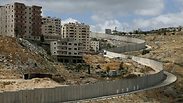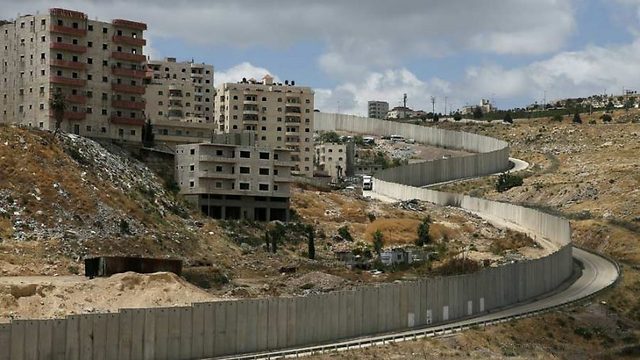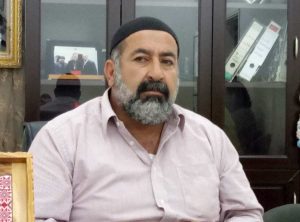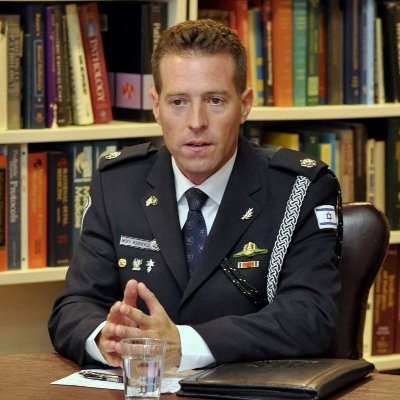

Shuafat refugee camp: Between a rock and a hard place
Shuafat, a Palestinian neighborhood in east Jerusalem, suffers from mounting uncollected garbage, rampant crime and a general lack of access to municipality services, as its residents—while officially part of Greater Jerusalem—are stuck between Israel and the PA.
Shuafat refugee camp—a rotting stench of garbage hangs in the air here, the only refugee camp within the municipal borders of Jerusalem. But the camp is also behind the barrier that Israel calls a security fence and Palestinians call an apartheid wall.
Officially, the Jerusalem municipality is responsible for all services inside the camp. But in practice, many Israeli service providers, including garbage collectors, do not enter the Shuafat refugee camp as they say it is not safe to do so. The residents of the camp burn some of their garbage; the rest pile up where it rots in the sun and makes it hard to breathe.
Sitting behind his desk at a local community organization, Mahmoud al-Sheikh, a large imposing man with a salt-and-pepper beard, is trying to solve the garbage problem, along with all of the other issues in this refugee camp of 80,000 people.
“We are caught between the Israeli occupation here and the Palestinian Authority which has marginalized Shuafat,” Al-Sheikh told the Media Line. “We are the eastern gate of Jerusalem and we pride ourselves on being part of Jerusalem."
Then he says something surprising for a self-described Palestinian nationalist who has spent a total of eight years in the Israeli prison system starting from the age of 15, where he was arrested on charges of throwing stones at Israeli soldiers.
“There is no security here in the camp,” he said. “Israel has totally withdrawn and the Palestinian Authority cannot help because they are not allowed in Jerusalem. There is shooting, guns and crime all the time. We are in desperate need of security control. We would even rather the Israeli police come here and impose order."
There is a new Israeli police station which opened three months ago at the checkpoint on the other side of the barrier.
“It is part of a program of expanding police stations to give support to local Arab Israeli communities,” Israel’s Police Spokesperson Micky Rosenfeld told The Media Line. “Residents can make complaints in Arabic and if they need to go to a police station, they do not need to go to the other side of town."
Rosenfeld said that police officers do enter the area of the camp to carry out arrests when needed. But al-Sheikh and others say that arrests are only made in attacks on Israelis, and not in cases of robberies or drug deals.
But Al-Sheikh says that efforts by the municipality are too little too late. He is a member of the Popular Committee in the camp, a group associated with the Fatah movement of the Palestinian Authority. They are responsible for providing many of the local services in the communities, and coordinate with UNRWA, the UN body responsible for providing for refugees.
He said that recently he has helped form a “tribal committee” with representatives from all of the prominent families in the camp. He said it is an attempt to solve many of the issues in the camp including violence and unlicensed guns.
The Palestinians who live here have the blue Jerusalem ID card that identifies them as Jerusalem residents. It gives them freedom of movement that other Palestinians in the West Bank do not have, as well as access to Israeli health care and social services.
At the same time, since the camp is a Palestinian refugee camp, UNRWA is in charge of education and health care in the camp itself. The surrounding neighborhoods of Ras al-Khamis and Sawahre are under the control of the Jerusalem municipality.
UNRWA runs three schools inside the camp as well as a host of private schools. Classes are often crowded, and the schools run two shifts per day. UNRWA puts the number of refugees at 12,000 although it has not conducted a recent census and the number is believed to be much higher. The total population of the camp and nearby neighborhoods is about 85,000.
In the neighborhoods surrounding the camp, the situation is a little different. There, students either study in local schools run by the municipality, or cross the controversial barrier to attend larger schools in east Jerusalem.
Recently, the Israeli Knesset gave preliminary approval to a bill to make the Shuafat camp and the neighborhood of Kufr Aqab its own local council, with closer ties to the Palestinian Authority in the West Bank. Israeli press reports say that the PA would be responsible for local services like garbage collection. But it also effectively means cutting off the camp from Jerusalem, which some residents fear could be the first step to taking away their Jerusalem ID cards.
Israel began building the barrier in 2002 at the height of the second intifada, with its suicide bombings and attacks on Israeli soldiers and civilians. Much of it is a fence, but in heavily populated areas like the Shuafat refugee camp, it is a concrete wall. About ten percent of the West Bank is on the “Israeli” side of the wall.
In the case of Shuafat, the residents are on the “Palestinian” side of the barrier, which makes it harder for them to reach other parts of east Jerusalem. Poverty levels throughout east Jerusalem are high, and in Shuafat they are even higher. Residents of the camp say there have been 37 “martyrs,” or Palestinians killed while attacking Israelis or in demonstrations, over the past few years.
The camp was first built in 1965 when Jordan controlled east Jerusalem. The population expanded in 1967 when Palestinians who lived in the Jewish quarter were brought here. In recent years, tens of thousands more have poured into the camp from other areas of the West Bank, afraid that if they are not living in Jerusalem they could lose their residency permit and their Jerusalem ID card.
Israeli human rights groups say that since 1967, more than 14,000 Palestinians have lost their residency permits in Jerusalem. Prices have climbed in east Jerusalem and Shuafat is one of the areas that remain reasonable. Thousands of Palestinians with Jerusalem IDs, who had been living in the West Bank, have moved to Shuafat, fearful that Israel could take away their IDs if they are not living in Jerusalem.
Al Sheikh also says that Palestinians with social problems including domestic or business disputes have fled to the camp. Camp leaders say they are also concerned about the issue of domestic violence, and the use of guns within the camp.
“We try to create awareness of the danger of violence both in society and within the family,” Ashgan Abu Rmieleh, a female member of the Popular Committee told The Media Line. “We run workshops for parents and children, and try to increase education.”
Jerusalem municipal officials say the unique situation in Shuafat, the only refugee camp inside Jerusalem, is especially challenging but they are working hard to improve it.
A spokesman for the Jerusalem Municipality told The Media Line that the city has stepped up its police presence in the area, and is trying to impose law and order in all of east Jerusalem.
“The city of Jerusalem is investing millions of shekels each year to improve the quality of life of the residents of the camp and the adjacent neighborhoods, both in terms of infrastructure and in social and community aspects,” the spokesman told The Media Line. “These include efforts to pave streets in the camp, building community centers and better treatment of garbage.
Reprinted with permission from The Media Line .


















